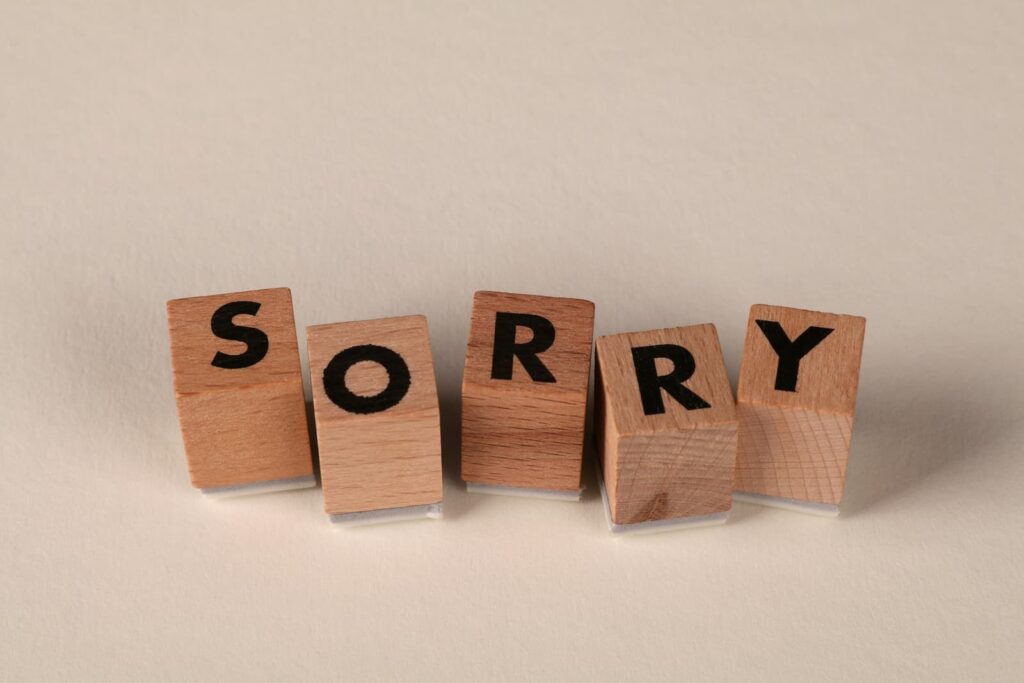
Other Ways to Say "I'm Sorry" in English

Made a mistake?
When you need to apologize, "I'm sorry" is a simple and effective phrase to use, but it's only one example of many other possibilities.
This article will introduce ten alternatives to "I'm sorry" along with example sentences. Some of these alternatives are appropriate in professional settings, while others are better to use with friends. Let's take a closer look.
Other Ways to Say “I’m Sorry”
“My bad/mistake.”

These two phrases are great to use with friends in casual situations when your mistake wasn't too serious.
Oops! I forgot to take out the trash this morning. My mistake.
"My bad" sounds more casual than "My mistake."
“I messed up.”
This casual phrase is a short way of saying that you've made a mess of a situation.
I shouldn't have lost my temper like that. I messed up.
We messed up; we should have asked you first.
"Messed up" doesn't always mean "I'm sorry" — in some situations, it simply means "I made a mistake."
The last time I tried this recipe, I messed up, so I'm going to try it again. Hopefully I'll do better this time!
“I screwed up.”
"Screwed up" is even more informal than "messed up," so use it carefully.
I accidentally told John about the surprise party we were planning for him. I screwed up!
“You were right.”
Telling someone that they were correct when you originally thought they weren't is an effective way to say you're sorry.
You were right. I shouldn't have been so stubborn.
“I dropped the ball.”

"Dropping the ball" is making a mistake. This phrase is often used in business situations.
It was our team's job to handle it, and we dropped the ball. I take full responsibility.
Don't forget that you can use some of these phrases together with "I'm sorry" to form a fuller apology.
I'm sorry for dropping the ball. I won't let it happen again.
Related article: 7 Business English Expressions That Come from Sports
“Please forgive me.”
Asking someone for forgiveness is a strong way to show that you were wrong.
I shouldn't have yelled at you like that. Please forgive me.
You can also use this phrase together with other examples from the list. You'll see this demonstrated later in the article.
“I owe you an apology.”
Use this phrase before explaining what you need to apologize for.
I owe you an apology. I was really angry last night, and I said some things that I shouldn't have.
“My apologies.”

"My apologies" is a more formal alternative to "I'm sorry."
My apologies for keeping you waiting. Are you ready to begin?
If you want to sound even more formal, you can say, "Please accept my apologies."
Please accept my apologies for the poor service you received. Your meal is on the house.
“I feel terrible about … “
If you're unhappy about something you've done or the way you treated someone, tell them that you feel terrible about it.
I feel terrible about how I treated you. Please forgive me.
“I was out of line.”
Someone who's "out of line" is acting inappropriately, so use this phrase to admit that you weren't acting like a good friend, colleague, etc.
My behavior at yesterday's event was out of line, and I apologize.
Those comments were way out of line. I don't know what I was thinking — please forgive me.
Related article: Useful Idioms and Phrasal Verbs With "Line"
Wrap-up
While "I'm sorry" is effective, if you want to be a fluent speaker, you need to expand your vocabulary with alternatives to fit various situations.
If you'd like to practice your English in a real conversation, book a lesson on Engoo. Engoo lessons are just 25 minutes, and tutors from around the world are ready to help you any time of day. Give it a try!



